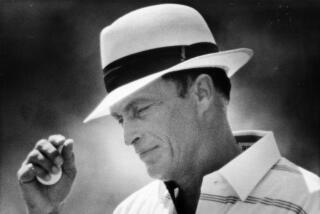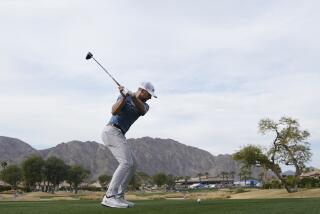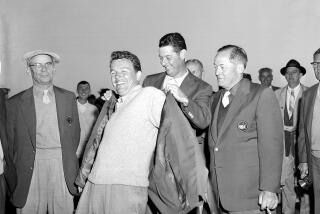An Iron Will Was Nicklaus’ No. 1 Weapon
Anybody who ever galleried an Open can tell you what made Jack Nicklaus a great golfer--character.
Oh, he hit the ball farther than anyone else when he first came along. But long hitters have appeared on the scene throughout golf history, drawing their oohs and aahs from the galleries without making much of a real dent on the scoring records or victory rolls.
In the case of Jack Nicklaus, it was not his long game that made him the greatest ever to play the game. Neither was it his short game, his putting, chipping, trouble shots--he never needed any. He couldn’t do anything with a 5-iron that two or three dozen other golfers couldn’t do. He didn’t have any secret body turn, any mystery to his wrist cock or motion through the ball.
What made Jack great was enormous self-respect, the tunnel vision that all sports geniuses have from Ty Cobb to Babe Ruth to Jack Dempsey to Joe Louis.
The great thing about golf is, your opponent is never the sand, the water, the trees, the wind, the rough or the slickness of the greens. It’s yourself.
Before he ever beat Arnold Palmer or Oakmont or Pebble Beach or Lee Trevino or Gary Player, he had to beat Jack Nicklaus.
How well did he do it? Well, did you know that Jack Nicklaus smoked? And did for most of his career? Probably not. That’s because you never saw him do it. Nicklaus never smoked in public. He didn’t think it was a good image.
You ever see him throw a club? Curse a spectator? A marshal? You ever see him lose his temper? He’s got a pretty good one.
You never saw him closing a bar, giving any kind of scandal. You never even saw him drinking from a can.
There are a lot of people who don’t even know Jack Nicklaus was fat. That when he joined the golf tour he looked like a sausage in cleats. He didn’t walk, he waddled. His clothes fit him like a tent. He moved down a fairway like a sack of potatoes.
Spectators hated him. That was partly because he was beating Arnold Palmer, who in those days was America’s team, to golf what Dempsey had been to boxing or Musial to baseball.
But if Jack had looked like Ronald Trueheart--or even Ronald Reagan or Steve Garvey--the blow wouldn’t have been so hard to take. If he’d had broad shoulders, a tiny waistline and movie-star good looks, audiences might have been mollified. As it was, this ill-fitted chunk of a kid, who looked 45 when he was barely 20, outraged America as if he had been caught stoning stained-glass windows.
No one liked to eat like Jack Nicklaus. But he stopped. He gave up the oysters, the baked Alaskas, the pizzas with everything. He hired a color consultant--he’s color blind--and he made over Jack Nicklaus. He went from looking like Herman Goering to looking like Lochinvar.
Now, lots of guys have lost weight. Even on the golf tour. But not many keep it off.
Jack did. Jack does whatever he sets out to do. He took off the beef even at the risk of losing distance off the tee or losing tournaments because he had to drop one or two clubs down from his best shooting.
Jack Nicklaus never gave in an inch to Jack Nicklaus. If he was going to be in command of the play, he was going to be in command of the player.
You had to respect Jack Nicklaus. He became an authentic American sports hero on sheer will.
A week from today, the ABC network will conduct an interesting retrospective on Jack Nicklaus and his career through the words of six men who were instrumental in fashioning it. Each mounted a challenge to Jack Nicklaus and either fell back or settled for a draw.
The six are Arnold Palmer, the man Jack supplanted as king of the golf hill; Gary Player, who shot at the king and missed; Lee Trevino, who beat Jack out of three major titles but who concedes that “Jack is over here by himself and we’re over there--day in, day out we couldn’t beat Jack Nicklaus;” Tom Watson, who wonders how Nicklaus turned a villain into a hero; Seve Ballesteros, who can’t believe that Nicklaus could handle 25 years of relentless pressure without burnout, and Greg Norman, the only one of the sextet who has not been sufficiently clawed by the Golden Bear to concede anything. Even Norman, though, got a sample of an attacking Nicklaus at last year’s Masters.
It’s a fascinating piece of Americana, demonstrating the extraordinary revealing powers of the medium.
It is evident, for instance, that, with Arnold Palmer, the wounds are still unhealed and unhealing. Arnold is the least accepting of the rivals, almost as if he were still hoping for one more playoff to settle the issue.
“The whole point is the competition (between them) is going to be there so long as we live, and maybe longer,” Arnold says.
So far as Arnold is concerned, Palmer and Nicklaus are always going to be Macy’s and Gimbel’s.
The others in the program, called “Merrill Lynch Presents Jack Nicklaus and the Greatest of His Time,” seem comfortable in Nicklaus’ shadow.
Watson, as a man who, however briefly in one British Open and one U.S. Open, stomped on the Nicklaus legend, is more fascinated to learn how Nicklaus handled the public abuse attached to beating Palmer.
“I never noticed it,” Nicklaus confesses. “I had blinders on. I never heard (the crowd). I didn’t care what they said. I was going to get where I wanted to get.”
Ballesteros wants to know how Nicklaus bore up under the terrible pressures of being Jack Nicklaus.
“You always look happy, relaxed,” marvels the Spaniard.
Explains Nicklaus: “I look around at the crowd, the cameras, and I say, ‘This is what we are all working for. This is what we came for.’ So I relax and enjoy it. I never get nervous.”
No one will ever do the things Jack Nicklaus has done on a golf course. Or with more grace. He won more tournaments than any other player who ever played the game except one, Sam Snead. He won 71 tournaments. But he finished second 58 times.
No one has come close to that. He was second in the British Open alone seven times.
The Jewish people have a word for such a man--a mensch. The golfers have a word for one, too. They call him “a player,” the highest compliment.
Well, Jack was the player’s player. He had the 15th club in the bag and it was an iron. Iron will. If you don’t think so, listen next Sunday to what the ultimate jury, six of the other greatest players in the game, thinks of him.
More to Read
Go beyond the scoreboard
Get the latest on L.A.'s teams in the daily Sports Report newsletter.
You may occasionally receive promotional content from the Los Angeles Times.










